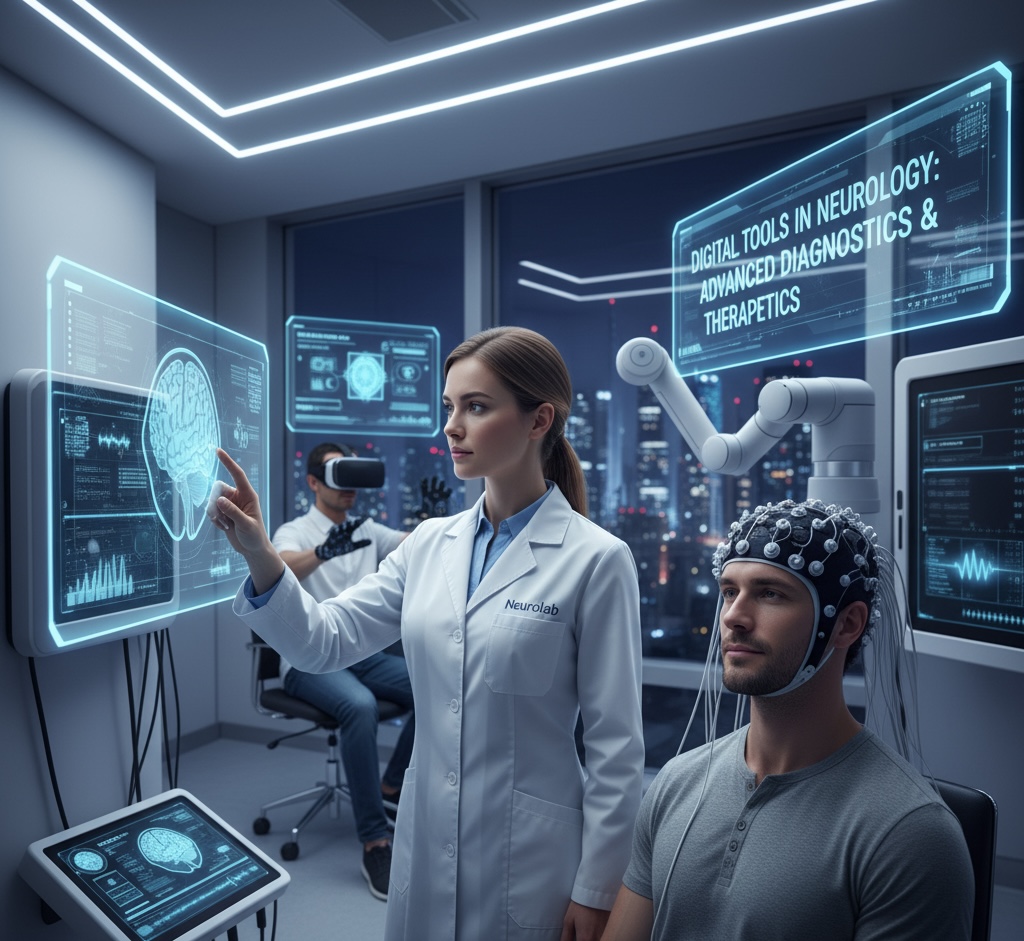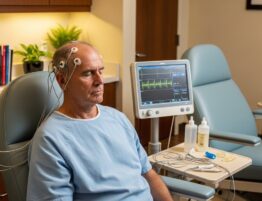Technology is revolutionizing how neurologists assess brain and nervous system disorders. Digital tools in neurology are dramatically improving diagnostic accuracy and helping detect conditions like epilepsy, Alzheimer’s disease, and stroke much earlier than before. Advanced imaging techniques provide detailed insights into brain structure and activity. Wearable devices track patients’ symptoms continuously in real-time. Artificial intelligence analyzes complex data more efficiently and accurately than traditional methods.
These technological advances enable faster and more precise assessments. Neurologists now rely on these tools to develop effective treatment strategies tailored to each patient. Digital monitoring supports remote patient care, expanding access to specialized neurological services. Patients benefit from quicker diagnoses and more personalized therapies based on their specific brain patterns.
The growing role of digital tools in neurology continues to drive innovation in the field. Research into new technologies evolves rapidly. Emerging tools, such as brain-computer interfaces, show tremendous future potential. Neurology is becoming more efficient, accurate, and patient-focused. Neurological assessment technology enables neurologists to improve patient outcomes and quality of life significantly.
Digital Tools in Neurology
Technology has revolutionized the way neurologists deliver care to patients with brain and nervous system disorders. Mobile apps, wearable devices, and online platforms assist doctors in diagnosis and ongoing patient monitoring. Digital tools in neurology enhance assessment accuracy and aid in managing conditions such as epilepsy, Parkinson’s disease, and migraines. These tools streamline clinical workflows and improve patient outcomes.
Key digital tools in neurology:
- Mobile apps: Log symptoms like seizures or migraines instantly; track medication adherence; provide direct patient-doctor communication
- Wearable devices: Monitor tremors in Parkinson’s patients; track sleep patterns for epilepsy management; detect heart rate changes
- Telemedicine platforms: Enable remote consultations; allow secure sharing of test results; connect specialists for collaborative care
- AI analysis tools: Analyze MRIs for abnormalities; predict seizure risks; speed up diagnostic processes
- Data integration systems: Combine patient information for comprehensive insights; support tailored treatment plans; improve long-term monitoring
Digital tools in neurology are transforming patient care significantly. They save time and enhance diagnostic accuracy. Patients benefit from better symptom tracking and improved access to specialists. Neurologists gain deeper insights into disease progression and the effectiveness of treatments. Ongoing technological advancements promise even more precise and helpful tools. Technology empowers better management of neurological disorders for both patients and healthcare providers.
Neurological Assessment Technology Today
Modern technology has dramatically improved how doctors diagnose brain and nervous system disorders. It provides reliable methods for detecting problems early, often before symptoms become severe. Advanced tools include digital imaging, electrophysiological monitoring, and computerized cognitive testing. These technologies provide precise, non-invasive insights into neurological conditions. Neurological assessment technology enhances diagnostic accuracy and enables faster evaluations in clinical settings.
These innovations streamline medical procedures and reduce patient discomfort during testing. They support timely interventions and better treatment planning. Neurological assessment technology improves outcomes for patients with complex neurological conditions. Modern tools allow doctors to see detailed brain structures and measure electrical activity with unprecedented precision.
Key neurological assessment devices and methods:
- MRI (Magnetic Resonance Imaging): Produces detailed images of brain structure and tissue
- CT (Computed Tomography): Quickly detects brain injuries, bleeding, or abnormalities
- EEG (Electroencephalography): Measures electrical brain activity to identify seizures
- fMRI (Functional MRI): Tracks active brain regions by measuring blood flow
- DTI (Diffusion Tensor Imaging): Maps white matter pathways in the brain
- Wearable sensors: Monitor movement, tremors, and seizures continuously
- AI-based analysis: Enhances interpretation of imaging and EEG results
- Digital neuropsychological testing: Assesses cognitive functions through computerized tests
AI in Neurological Diagnosis
Artificial intelligence is revolutionizing how doctors diagnose and treat brain and nervous system disorders. AI in neurological diagnosis enhances accuracy, speed, and accessibility in medical practice. AI systems analyze complex medical data quickly, enabling doctors to make more informed decisions and identify problems earlier.
AI excels at processing vast amounts of data from MRI scans, EEG recordings, and patient histories. Machine learning algorithms can identify subtle patterns in brain scans that human eyes might miss. These systems can detect early signs of Alzheimer’s disease, differentiate between tumor types, and spot stroke indicators in CT scans. AI models also predict disease progression, enabling more proactive care approaches.
Key benefits of AI in neurological diagnosis:
- Improved accuracy: Detects subtle patterns and abnormalities in brain scans
- Faster diagnosis: Rapidly analyzes imaging data that would take humans much longer
- Early detection: Identifies disorders like Alzheimer’s or Parkinson’s in early stages
- Personalized treatment: Tailors care plans based on individual patient data
- Seizure prediction: Analyzes EEG patterns to forecast epileptic episodes
- Stroke detection: Quickly spots signs of stroke in CT and MRI scans
- Automated reporting: Generates detailed diagnostic reports efficiently
- Reduced errors: Minimizes mistakes in analysis through consistent algorithms
- Remote access: Supports telemedicine diagnostics in underserved areas
- Data integration: Combines multiple test results for a comprehensive assessment
AI in neurological diagnosis reduces diagnostic delays, which is particularly important in underserved areas with limited access to specialists. It supports neurologists by flagging critical findings that need immediate attention. As AI algorithms continue evolving, they’re being integrated with wearable devices for real-time health monitoring. This technology enables precise, efficient, and scalable neurological care. AI is revolutionizing diagnostic capabilities and making specialized neurological assessment available to more patients worldwide.
Modern Brain Scanning Methods
Advanced brain scanning methods provide unprecedented insights into brain structure and function. They enable specialists to detect subtle abnormalities that older technologies might miss. These innovations play crucial roles in accurately diagnosing neurological disorders, including tumors, strokes, and degenerative diseases like Alzheimer’s and Parkinson’s.
MRI and CT scans remain essential tools in clinical practice, providing reliable imaging results for a wide range of conditions. However, newer advancements include functional imaging techniques and higher-resolution scanning methods. These innovations enhance diagnostic precision and make brain imaging more accessible. Together, these methods empower doctors to intervene earlier and develop more effective, personalized treatment strategies.
Key modern brain scanning methods:
- PET (Positron Emission Tomography): Visualizes brain metabolism and chemical activity
- MEG (Magnetoencephalography): Maps magnetic fields generated by brain activity
- MRI (Magnetic Resonance Imaging): Creates detailed brain images using powerful magnetic fields
- Quantitative MRI: Analyzes specific tissue properties for precise diagnostics
- Portable MRI: Enables bedside brain imaging in emergency and critical care settings
- AI-enhanced imaging: Improves scan analysis speed and accuracy significantly
- MR Spectroscopy: Assesses brain chemical composition non-invasively
- TMS (Transcranial Magnetic Stimulation): Stimulates specific brain areas for both diagnostic and therapeutic purposes
Portable MRI devices are expanding access to brain imaging in remote areas and emergencies. AI integration significantly accelerates image analysis, enabling the detection of subtle abnormalities that radiologists might otherwise overlook. These modern brain scanning methods improve early diagnosis, guide treatment decisions, and support ongoing research. Continued advancements promise even clearer, faster, and more accessible brain imaging solutions for patients worldwide.
Technology in Neurological Health
Technology is revolutionizing long-term care for brain and nervous system disorders. It enhances continuous monitoring, treatment delivery, and patient quality of life. Advanced tools offer personalized and accessible solutions for managing chronic neurological conditions. These technologies enable patients to maintain their independence while receiving the care they need.
Key technologies supporting long-term neurological care:
- Wearable devices: Track seizures and movement continuously in daily life
- Telemedicine platforms: Enable remote consultations and ongoing monitoring
- AI analytics: Predict disease progression and personalize treatment approaches
- Implantable devices: Deliver targeted brain stimulation for epilepsy and movement disorders
- Mobile apps: Support cognitive therapy exercises and medication reminders
- Remote EEG monitoring: Tracks brain activity outside clinical settings
- Virtual reality therapy: Aids rehabilitation for stroke and brain injury patients
- Smart home systems: Monitor patient safety and detect behavioral changes
- Robotic exoskeletons: Assist mobility in patients with neurological impairments
- Cloud-based systems: Centralize patient records for coordinated care
Mobile apps provide cognitive exercises for people with dementia or brain injuries. Virtual reality creates immersive environments that support motor recovery after stroke. Smart home systems can detect falls or unusual behavior patterns, alerting caregivers when needed. Technology in neurological health empowers patients with tools for greater independence and continuous care. It reduces hospital visits while improving treatment outcomes. Future innovations will likely include more advanced neural implants and brain-computer interfaces, promising even more effective management of chronic neurological conditions.
Future of Neurological Assessment Technology
The future of neurological assessment technology holds tremendous promise for groundbreaking innovations in diagnosing brain disorders. New tools will significantly enhance precision, accessibility, and patient comfort. These advancements will transform how doctors evaluate neurological health and catch problems earlier.
Key digital tools in neurology shaping the future:
- Non-invasive brain interfaces: Monitor brain activity without surgery or implants
- Advanced neuroimaging: Provides ultra-high-resolution brain scans with unprecedented detail
- Portable diagnostic devices: Enable comprehensive brain assessments at home
- Real-time neural mapping: Tracks brain function instantly during activities
- Biomarker detection tools: Identify diseases through simple blood or saliva tests
- Augmented reality diagnostics: Visualize brain structures interactively during exams
- Quantum imaging: Dramatically improves scan clarity and processing speed
- Brain-computer interfaces: Assess cognition through thought patterns and mental tasks
- Predictive AI models: Forecast neurological risks years before symptoms appear
- Nanotechnology sensors: Detect neural changes at the microscopic cellular level
Biomarker tools will simplify neurological assessment through routine blood tests rather than complex brain scans. Brain-computer interfaces will enable diagnostic procedures based solely on mental tasks. The future of AI in neurological diagnosis will prioritize patient convenience and precision simultaneously. These innovations will empower truly proactive care, catching neurological problems before they cause significant damage. The combination of these technologies will make specialized neurological assessment accessible to far more patients while reducing costs and improving accuracy. These advances represent a major leap forward in brain health care.











I've given up... the stress her office staff has put me through is just not worth it. You can do so much better, please clean house, either change out your office staff, or find a way for them to be more efficient please. You have to do something. This is not how you want to run your practice. It leaves a very bad impression on your business.
Please, leave your review
Write a comment: